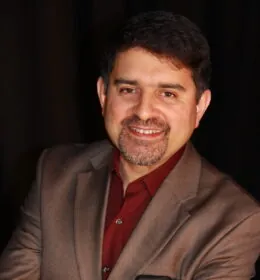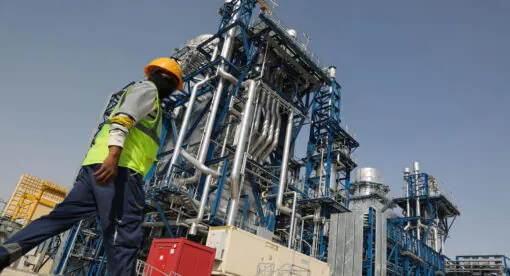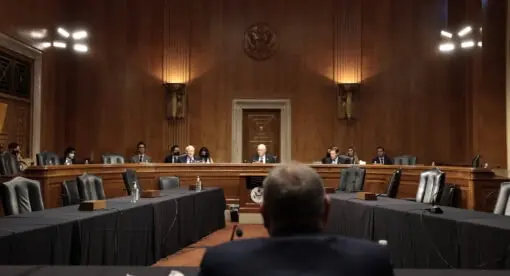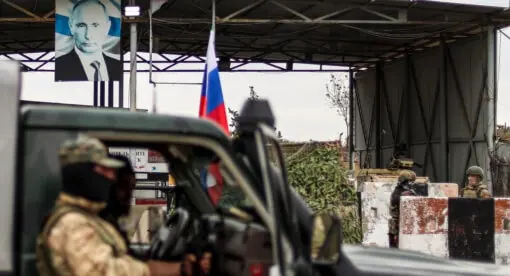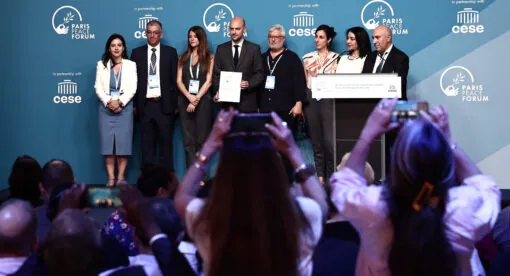In this first episode of Eurasian Connectivity in the new year, host Kamran Bokhari speaks with Dayne Curry, the country manager for Mercy Corps in Afghanistan, about developments in the Taliban-ruled country since its exit from the headlines, its current humanitarian situation, and what the future may hold for its people.
Kamran Bokhari:
Hello, everyone. This is Kamran Bokhari. Welcome to another episode of Eurasian Connectivity at the New Lines Institute for Strategy and Policy. This is the first episode of the new year 2024, and I have a very special guest who will tell us a lot about a place that we seem to have forgotten collectively. I’m talking about Afghanistan. And it’s understandable, there’s a lot going on in the world across Eurasia, the Middle East.
There is no shortage of crises here in the United States, so one understands that there is a bandwidth issue. But considering that the United States and its allies spent a generation in Afghanistan, it’s important that we not forget about it and to help us, to remind us that there is still a conflict brewing in that country is my guest, Dayne Curry, who is the Country Director of Mercy Corps in Afghanistan. He’s worked full-time in the country for an amazing 16 years, and I’m going to give him a chance to explain how he accomplished that.
It’s impressive. He has held senior leadership roles in international NGOs as well as management positions in the private sector. He spent a lot of time in Kabul, in Mazar-i-Sharif, and Herat, and he’s managed projects across 12 Afghan provinces. He has a wide range of expertise when it comes to different sectors, but his focus has been on food security, agriculture, economic recovery, and value chain development. Welcome to Eurasian Connectivity, Dayne. Good to have you.
Dayne Curry:
Thank you very much. It’s great to join you.
Kamran Bokhari:
Thank you. Okay, so I guess I gave our listeners the preview. Tell us a bit, before we dive into the topic, tell us a bit about what’s kept you in Afghanistan for so long and we’d love to hear what fascinates you about this place. And especially once the US has left, a lot of people departed from the country, but you still seem to be there, so tell us about that story.
Dayne Curry:
Well, personally, I’ve found Afghanistan to be an extremely compelling place for over half my life, I suppose. As a student, I did a lot of study and research on Afghanistan, specifically related to human rights and the former term when the Taliban were the ruling regime in Afghanistan prior to 2001.
And had the opportunity to travel there in 2004 for the first time as a college student, worked as an intern with an NGO and that really opened up an opportunity to continue to invest in the country personally and professionally. I’ve not only found Afghanistan a compelling place to work and the work very important, but also the Afghan people to be incredibly generous and charitable and wonderful people to spend time with.
Over the years, having the chance to develop friendships and close relationships with colleagues and people who I’ve been close with, I’ve just been motivated to continue to contribute whatever way I can, whether that be in simple management positions of projects or in leadership positions like I’m currently in with Mercy Corps really is an honor and I find it just a really great privilege to have the opportunity to contribute to partnering with Afghan people as they recover from the challenges that they faced over the past 50 years.
Kamran Bokhari:
Wow. So tell us a bit about what does working in Afghanistan these days at least since 2021, summer of 2021, what does it look like? I mean, obviously there are many security challenges. We hear a lot in the media about insecurity. We hear about all the challenges that the Afghan people are going through, so what does working in Afghanistan under the current circumstances, what does it look like?
Dayne Curry:
Yeah. Well, there are plenty of things that have changed. There are many things that are quite similar to as they have been for the past 20 or 25 years. For a humanitarian, the most important aspect of working in any country, and in Afghanistan that’s certainly been true, is access, maintaining the ability to reach the people who are most vulnerable with the assistance that they need, both emergency humanitarian assistance and longer-term development assistance.
And the question of access has certainly looked different over these years. Ten or 12, 15 years ago, access was very much focused on a question of security. The country obviously 10, 15 years ago was right in the middle of what was a difficult, for all intents and purposes, civil war between the Democratic Republic forces that were backed by NATO and the United States and the Taliban and the resistance forces that were fighting along several different fronts. And access for us really looked like, where can we go?
Can we go to these locations where there is active conflict going on? Can we reach places where it may not be safe for humanitarians to travel to, even? Can we negotiate with different ruling authorities and different political bodies in different regions of the country just to be able to make sure that people who are vulnerable can receive the assistance that they need?
That looks different today than it did five years ago, 10 years ago. Access is still important, but generally speaking, active conflict has ceased in the country. Yes, there are regions where there are still security challenges. And certainly when we send our teams to locations in different various provinces to implement humanitarian programs, we take security very seriously. But certainly the active conflict which was present 10 or 15 years ago is no longer active.
However, access for us now looks like, are we able to reach the communities of people who are vulnerable, who may not be able to have as much presence in the public square as they once used to? For example, are we able to provide assistance to women and girls to the extent that we believe that they need to have access to that assistance based upon the current political and social climates?
Can we reach and provide assistance to people with disabilities and other vulnerable groups who may not have received the same attention from the current ruling authorities as the previous regime? Can we overcome some of the administrative and other bureaucratic obstacles which face humanitarian organizations to provide assistance to communities and making sure that we’re permitted to go out into the field and deliver assistance?
And then even just a question of, do we have the funding available to us as resources are not as prevalent in Afghanistan? The competition for humanitarian aid assistance is spread across many different countries and locations where there are active humanitarian crises. Do we have simply enough funds to be able to provide the assistance that’s out there? And so the question for us is still a question of access. It certainly looks different than it did 10 years ago, but it’s one that we are continuing trying to overcome some of the challenges that we face.
Kamran Bokhari:
Thank you. Thank you for that detailed description. I’m going to sort of ask you, probe a little bit more on that. And I want to go back to my earlier point about the world having largely kind of forgotten Afghanistan and its people, I mean, it’s still there, but in terms of priority, there are things that are geopolitically speaking more significant and the global attention span or the bandwidth to deal with Afghanistan is just not there.
So can you give us a sense of what life is like for Afghans? I mean, we hear a lot about the food crisis, we hear a lot about the crackdown on education and employment opportunities for women and girls, but these are sort of superficial treatments that we get in the media from time to time. Give a sense to our listeners as to what the Emirate regime of the Taliban looks like on a day-to-day basis and away from sort of the headlines in different areas. And you travel quite a bit. And give us a sense of granularity there.
Dayne Curry:
Yeah. Well specifically related to some of the questions of Afghanistan somewhat being a forgotten location, I think one perfect example of this is in the current events that have occurred this last fall, we all remember on October 7th the incidents that happened in Gaza and southern Israel. Obviously we’re still seeing the effects of that today.
But what few people remember is that October 7th is also the day that multiple earthquakes over 6.0 on the Richter scale hit western Afghanistan in the province of Herat, that same day, and killed thousands of individuals and left tens of thousands of families extremely vulnerable, had their communities completely devastated. Many people forget that that event actually happened on the same day. And I remember watching the news wall to wall all day coverage of the situation in Israel and Gaza, and certainly that was a difficult situation, but kind of watching as the news in the last 10 seconds of every newscast said, “Oh, by the way there was an earthquake and Afghanistan.”
And our teams as we were responding to that, desperately trying to get attention for that situation, not because we necessarily want the new spotlight, but because we need the attention in terms of the assistance coming into Afghanistan to be able to respond to crises like this, and with people not quite understanding the devastating consequences of that earthquake. I visited one community in Herat where of the 150 people living in that community, only five people survived.
And there were numerous villages and communities that had similar type impacts, similar type stories, and largely few people have known anything about that earthquake. And I think that’s a microcosm of what Afghanistan has been experiencing since the pullout in 2021. Of course there was a lot of media attention that has gone into what the consequences of the pullout were. There’s been a lot of media attention in terms of the human rights situation involving women and girls, rightly so.
That’s a challenging situation. But there are many, many Afghans who in the aftermath of 2021 are simply trying to pick up the pieces and go on with life. Life did not stop for Afghans and Afghan cities and Afghan villages. It continued to go on. And the most important aspect of moving on is how Afghans begin to recover economically. The reality is that after 20 or 25 years of control by the democratic republic of Afghanistan and the United States and Western supporters, the Afghan economy was extremely fragile in 2021 and it is still extremely fragile.
The World Bank and the data they provide spells out that the Afghan economy is heavily dependent on international assistance coming in and it was in 2021 and it still is today. The amount of investment, the amount of confidence that the Afghan, regular Afghan family has to be able to either invest in private business or invest in some sort of livelihoods is extremely low and extremely weak.
The banking sector is weak, and so that has consequences on the ability of the average Afghan just to take care of their families. And jobs are very hard to come by in Afghanistan. Anecdotally, everywhere I go. When I’m out in the city and when I’m interacting with Afghan families, the question that I’m always asked is, “Do you know how my son or my brother or my sister or my cousin, do you know if they can find a job somewhere, whether it be within an NGO or do you know of a business? Do you know someone that can provide a job?”
The Afghan economy is extremely fragile in that way and for Afghans, that’s the overriding story currently, is how they can manage to provide for their families. And that’s true whether you’re talking about upper, middle class Afghan families so to speak, or the most economically vulnerable, the poorest of the poor amongst Afghan communities. There is a bit of a divide I think for the average Afghan.
Even kind of defining what the term average Afghan means is a little bit challenging because there is a divide between some of the more urban, educated, wealthier, so to speak, or well-to-do Afghan families in the cities of Kabul and Herat and Mazar-i-Sharif, and then communities, rural communities, very impoverished communities that are reliant on agriculture and live on maybe one or two dollars a day and barely make it to be able to provide just enough food and clean drinking water for their families.
The situation looks very different for those groups of people. Likewise, it looks different geographically where you are. Certainly for families in urban regions and in the North and in some of the central regions that were exposed to relatively more peace over these past 20 years, it’s been a stark difference in trying to understand what the rule of the de facto authorities means for them and what it means for their families moving forward.
For Afghan families who have been on the front lines of fighting, there’s actually a bit of a breath, I think, an exhale that is occurring for some of those families because regardless of how we’ve gotten there, it is welcome that this is a moment of relative peace for those communities, that they can take a step back from what has been two decades of consistent fighting and unrest and try to figure out how they begin to move forward with rebuilding their lives.
I was visiting one community in the Spin Buldak district of Kandahar and we were speaking with the village elders of a community that was completely displaced by conflict. All 500 families are no longer living in their village. Their homes have been destroyed, their water systems have been completely dilapidated—
Kamran Bokhari:
You are referring to—sorry to cut you in.
Dayne Curry:
Yeah, no problem.
Kamran Bokhari:
You’re referring to these families have been displaced because of the conflict that goes back several years, 20 years, right?
Dayne Curry:
Yeah. I mean, there’s long-term displacement. And as they reflected to me, they said, “We know that there’s been conflict, we know there’s been war between Afghanistan and the West, but this is a time for peace and a time for us to try to move forward with things.” And I understand that sentiment. There’s a lot of challenges in Afghanistan, a lot of unknowns, but also a cautious hope that maybe there will be a way forward for more lasting peace.
Kamran Bokhari:
Well, thank you for those insights, Dayne. How have you found the authorities? I mean, how welcoming are they? How facilitating are they in terms of enabling the work that you guys are doing at Mercy Corps? And I’m sure you have counterparts from other international organizations. It’s not what it used to be back in, before 2021 summer, but how are they getting along with you and how are you able to navigate this new regime considering all the sensibilities that they have? And obviously you must have made a lot of adjustments. Please speak to that.
Dayne Curry:
Yeah, there are differences. I do want to highlight the fact that there are some consistencies as well, though. What many people don’t realize is just because there is a new leadership regime and power, it doesn’t necessarily mean that the whole entire bureaucratic structure is gone. And of course, over 20 or 25 years, the Western Alliance, the United States and NATO helped to contribute to building governance within the country, and some of that still continues to persist.
And so there’s a fair bit of working under the same sorts of NGO law and administrative law and officials, many of whom are still the same as they were under the previous regime, the technocracy that continues to be there, but certainly with a leadership that is ideologically quite different than the previous leadership. And we know that there are significant ideological differences between how the current authorities view governance and rule of law and what marks a stable, successful society.
There’s differences in our ideological viewpoints of things and their ideological viewpoints on things. We can sit in a meeting and certainly have discussions over what it means to provide safe spaces for women and girls and access for women and girls to participate in society. There are differences of opinion ideologically there, and we acknowledge that.
As humanitarians, for Mercy Corps, embracing a humanitarian imperative not only means recognizing and negotiating in areas where we see ideological differences and trying to make progress in helping women and girls and others have access to an equitable society, but also to ensure that we are able to deliver impartial independent humanitarian aid based upon principles.
And even while we’re continuing to engage the authorities on some of those areas where we may have disagreements, we still are committed to delivering that humanitarian assistance on a day-to-day basis to ensure that those communities who are facing extreme poverty and who are not part of the political discussion, who are not part of a broader international discussion on what human rights looks like, they’re just trying to feed their families.
And we want to make sure that we remain committed to them and ensuring that they can receive the food assistance and the clean water assistance on a day-to-day basis. These are the sorts of programs that we operate from an emergency standpoint and we remain committed to that. Now that is still highly challenging and there’s a lot of work that goes into working with the authorities and engaging with them to make sure that we can do that successfully.
There’s quite a bit of bureaucracy in Afghanistan that’s built up, and we have to find ways to kind of cut through that bureaucracy so that we can rapidly respond to emergencies that occur so that we can find ways to provide resilience in the form of programs that provide jobs, programs that provide community-based infrastructure for water and agriculture.
We have to overcome some of those bureaucratic red tape to be able to do that. But while we are on one hand continuing to have discussions with the authorities about what it means to have an equitable society for all people within Afghanistan, we at the same time understand the humanitarian imperative that we have to deliver assistance to those who need it most at an emergency level and at a development level as well.
Kamran Bokhari:
I want to pick up on something you just mentioned in terms of the provision of basic services, clean water, meeting the basic food needs of people, and I want to ask, how do you see the regional states that have no choice but to engage with Afghanistan under the Taliban and from their own national security perspectives? I’m talking about the central Asian states, countries like Uzbekistan, Tajikistan, Turkmenistan, China is also, or at least appears from a distance to be involved.
There are problems between Pakistan and Afghanistan that make the headlines, but I’m sure there’s a lot of other assistance that’s moving from the East of the Durham Line to inside the country. Likewise, we hear about Iranian humanitarian assistance. And from my own travels to the country in years past, I know that Afghanistan is a big market for Iranian goods in general. How is all of that playing out and is it helping your work? Is it making things any better or is the challenge so huge in humongous that you’re barely able to move the needle?
Dayne Curry:
Well, we are aware that there are significant and complex political and regional challenges between the different neighbors of Afghanistan and how they approach their relations with the Taliban as the ruling regime in the country at this point. Historically, they all have varying different attitudes and relationships to those authorities, and we certainly from an NGO perspective, from Mercy Corps perspective, we don’t necessarily have a comment on some of those greater political challenges.
But they do affect our work as humanitarian aid workers in the country and have spillover effect. I mean, one example I can give to you is the current situation along the Afghanistan-Pakistan border and related to the return of hundreds of thousands of Afghan nationals who have lived in Pakistan as refugees over the past years and decades, who have now been returning to Afghanistan due to internal political dynamics in Pakistan that have either forced them to return or have created a climate which has made it imperative for them to return voluntarily based upon kind of ambiguities about whether they will be able to remain in the country.
And because of conflicts between the Taliban regime and the current authorities in Pakistan, as I’ve mentioned, there have been hundreds of thousands, I think at this count, nearly 500,000 Afghan nationals have returned both across the border into Nangarhar province, Jalalabad and the eastern provinces, and then into Kandahar province in the South. Mercy Corps has been working with other humanitarian partners to respond to that crisis because there are immediate needs for these families that are coming across.
Many of them have almost no financial resources. They don’t have almost no physical property when they’re returning and they don’t have anywhere to go when they immediately come across the border. So as we are working with partners to help them to get the necessary documentation they may need, get the necessary financial assistance they may need to be able to meet their daily needs coming across the border. Mercy Corps is responding specifically with support related to emergency water and hygiene supplies.
They’re settling in temporary camps for maybe days or weeks at a time before they travel on to their places of origin. Some of them can’t even travel initially for quite some time because the winter months in Afghanistan preclude their ability to travel on to regions where there’s heavy snowfall or bitter cold and they don’t have homes to return to. So certainly when there are political ongoings between the two countries and the governments, there are ramifications for the humanitarian response in Afghanistan.
We’re certainly sensitive to the fact that not only are 500,000 people or a million people plus returning to Afghanistan who need emergency assistance immediately, we’re also sensitive to the fact that these million individuals, these families are returning to communities across Afghanistan that are already devastated by conflict and economic hardship over these past years and are still struggling themselves on how to cope.
So when you add those numbers back into existing communities in Afghanistan, it strains the situation that much more. And we certainly are working to find ways through jobs trainings programs and economic development programs to ensure that they can find reintegration and not just face crippling poverty when they return to their home communities.
Kamran Bokhari:
I’m glad you brought up the expulsion of refugees from Pakistan and how that must have really put a huge strain on an already stressed political economy in the country. Following up on that, obviously your organization, Mercy Corps and other like-minded entities that are operating in the country have limited resources, and it’s very clear that the challenges of the country are just so huge.
So my question to you is what do you see on the ground in terms of the new government, the Taliban government trying to put together a semblance of a governance structure that addresses economy. And obviously their challenges given they are and given their history, the world is not ready to engage with them. So how do you see them working around? I mean, clearly there is contact with the outside world and if I may say, it is substantial. So do you see an effort and do you see those efforts bearing fruit?
Dayne Curry:
Well, certainly there’s a willingness and a desire by the authorities to engage in some measure with the outside world. And economically they are active in trying to find support for their economy. I know that they’re sensitive to longer-term development and the opportunity to have more investment and economic development in the country.
That is a priority for them. When I meet with authorities at the national and provincial level, that is a common request, that the international community focus on programs that will spur economic growth and development in the country and not solely focus on humanitarian emergency assistance, as important as that is.
Obviously the concern for the international community is that if there are to be steps towards re-engagement and a lessening of economic sanctions and other aspects of the current geopolitical climate that are hampering the ability of the Afghan economy to recover, that there be a proper conversation between the authorities and the international community on how to move forward on questions like human rights in relation to further economic development and growth.
And what many people may not know is that the UN has been taking steps to try to find a pathway, what I heard one diplomat call a pathway to a pathway. Certainly the international community is not recognizing the Taliban as the official government regime of the country at this point, but there’s certainly been discussions of how the international community can try to engage and try to help the Afghan economy begin to recover for the Afghan people.
Recently, the UN Security Council commissioned a special representative, a special coordinator to do an assessment of how the international community moves forward with the Taliban regime and with economic development. There were recommendations given to the Security Council, which they have voted on and approved.
They have appointed a special envoy for Afghanistan and have encouraged the de facto authorities in the Taliban regime that there are opportunities for future engagements if the authorities are able to live up to some of the international obligations that they have under treaties long signed by Afghanistan regarding human rights and the role of women and girls. And that conversation needs to go forward.
But for us as humanitarian organizations and as humanitarian actors, what we’re encouraged by in that discussion is that there’s a willingness to find a way forward. We are still sensitive about the overwhelming challenges that continue to face Afghanistan, and we will be cautiously observing how this discussion plays out between UN member states and the de facto authorities and what the political pathway, as fragile as it looks like, what that pathway moving forward looks like.
What we would advocate for certainly is the opportunity for those who have been living in poverty and conflict for two decades to begin to have hope for progress. And so certainly we would encourage political dialogue that would provide that hope and opportunity for people who are living with these enormous humanitarian challenges to finally see some of the root causes of their poverty being addressed, of economic development of the much-needed focus on the effects of climate change and how we can begin to see further development towards solving those questions in Afghanistan.
And we welcome a political dialogue with the understanding that there will be a clear focus on making sure that those who are in marginalized groups and those who oftentimes are overlooked from women and girls to the LGBT community, to people with disabilities, that there are certainly much needed attention given to their place and role in society and that they are not overlooked as Afghanistan continues to advance.
Kamran Bokhari:
I want to go back to, and I know we’re running out of time here, so I only have a couple of more questions for you, but I want to dig deeper into this idea of an Afghan civil society. And from what you’ve told me, it seems like there are large variations across geography, definitely as you mentioned, between urban areas and rural areas.
But the reason I bring up civil society is if you look at from the point of view of US and the international communities’ investments in terms of time, energy, resources, over the past 20 years, clearly the world failed to develop a democratic form of governance in Afghanistan and there is not much that can be done about it. And the work that you are doing clearly is not about that. And the world that is engaging in Afghanistan, with Afghanistan under the current leadership knows that there is not a whole lot of room for maneuver when it comes to the political system.
But at the end of the day, the world did leave behind a large mass of civil society that got used to a certain way of life. So where do you see that going? Is that civil society pulse still there or are just people overwhelmed by the challenges, the day-to-day challenges of finding food, clean water shelter, given the stark and staggering economic conditions in the country?
Dayne Curry:
Well, it is certainly a hugely challenging issue right now in Afghanistan for civil society actors to make much progress on good governance and peace building and democratic forums for people to have their voice heard. And you’re right, that much of that discussion is kind of drowned out by the pressing humanitarian concerns in the country. And when there are communities that are just focused on trying to figure out how they can have clean water, some of these discussions about civil society and building a more equitable society are perhaps pushed to the side, but that doesn’t mean that they’re not still there.
They certainly are. And there has been significant progress over these 20 years in building that civil society. International actors are well aware of this, and there are certainly discussions moving forward on how we can support civil society actors and organizations to continue to go about their work. That faces incredible headwinds. Even as recently as this last week, the authorities put forth directives that indicated that they would not support peace building programs or other programs that focus on awareness raising and advocacy because it doesn’t contribute to fixing, in their eyes, it doesn’t contribute to fixing the humanitarian and development crises that the country faces.
And so the authorities don’t recognize the need for or the importance of much of a civil society. But those groups still have a presence. And we as an organization like Mercy Corps and other NGOs, while we go about our work focused on humanitarian assistance, we certainly advocate for the continued presence and growth of civil society and a way forward for the voices of those who currently struggle to have much voice in the public square.
Certainly because it’s not just a question of kind of abstract democratic society building. As communities rebuild and develop and have a voice in how their economy redevelops, women and people with disabilities and others who want to have a voice in their government also need a voice in the practical day-to-day application of economic development, how businesses apply, provide jobs for them, how businesses provide services, how basic societal structures provide services to them.
They need to have a voice in that kind of meat-and-potatoes rebuilding of their country. And so we will still continue to encourage that. I don’t think we have a lot of clear answers on that so far. It certainly is a work in progress. There’s much that needs to be done on how we figure out how we support CSOs combined with the work of NGOs to move forward with the important work that they do, and also advocacy with the authorities to highlight the important work that CSOs continue to do in the country and not to sideline them in discussions about further economic growth.
Kamran Bokhari:
We’re almost out of time, and I wish we had more time, but as the case, all good things come to an end. But before I let you go, Dayne, I want to give you an opportunity to sort of say what you think Mercy Corps and the world in general needs. I mean, and this is an opportunity to sort of say, what is it that Washington can do to help support the work, the much-needed and critical work that you guys are doing?
What is it that US policy makers and decision makers can do to enable the hard work that you are putting in place? And some suggestions, some food for thought for Washington that looks at things from a different angle. It’s not the same angle as you have being on the ground. So in a minute or two, please sum up, what would you want to see Washington do more in terms of helping Afghanistan move forward given the extreme constraints that United States and the international community is under?
Dayne Curry:
Yeah, I would say two things. First, we recognize the fact that there may be more limited funding, but we encourage more strategic use of that funding. And when I say that, I mean development and resilience funding. Yes, the emergency support is needed, but we need to focus on how communities begin to recover in rebuilding businesses, rebuilding jobs, developing sustainable value chains, developing infrastructure and a way of life that is sustainable for them.
Much that has been done over the past 20 years has not been sustainable. We need to turn the page on that and find solutions for the Afghan people. And then secondly, I would say focus on solutions that are sustainable and appropriate for the context. Oftentimes, the West has come in with these giant development programs over these past 25 years, which have largely not worked. At the community level, if provided enough resources, families and communities can build the infrastructure and find ways to develop their communities, that it raises the standard of living for all families. Focus on community-based solutions that are appropriate and achievable and find an actual way forward for Afghan families to be able to provide for themselves.
Kamran Bokhari:
Thank you, Dayne. I hope and we’ll continue to work here at New Lines to make sure that this message gets to the people who need to hear it. Folks, that was Dayne Curry, Country Director for Afghanistan at Mercy Corps. This was a fascinating conversation. We don’t get to hear from people on the ground that often. Dayne is one of those people, important people who’s doing admirable work inside the country under extremely difficult circumstances.
I’m sure that we’ll have him again at some point to give us an update as to where things are, but for now, I’m going to thank him and I’m going to thank Mercy Corps for being our guest here at Eurasian Connectivity, a podcast that I host, Kamran Bokhari, at New Lines Institute for Strategy and Policy. This was our first podcast for the year, but there’s plenty more that we’ll be producing as the months roll on, and so stay tuned. A lot more will be coming from where this one came from. So signing off for now. Thank you so much and take care.
Dayne Curry:
Thank you, Kamran. Appreciate it.

